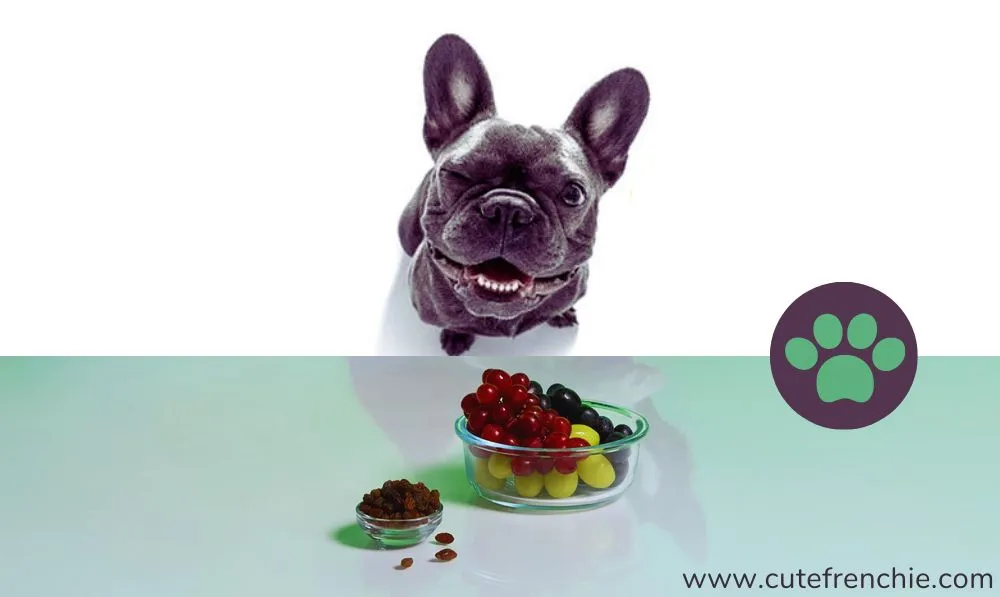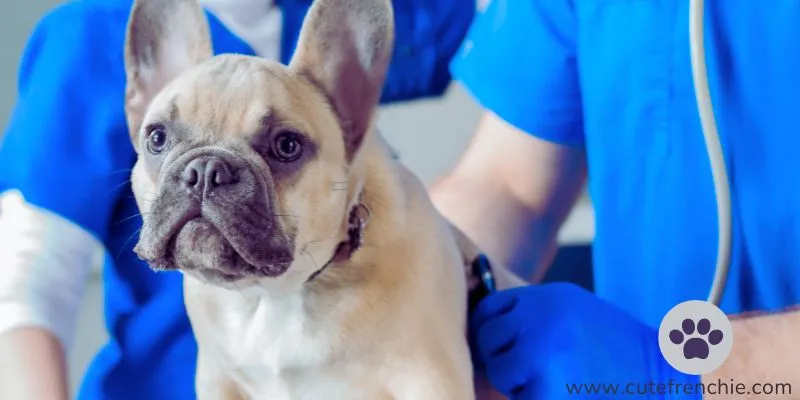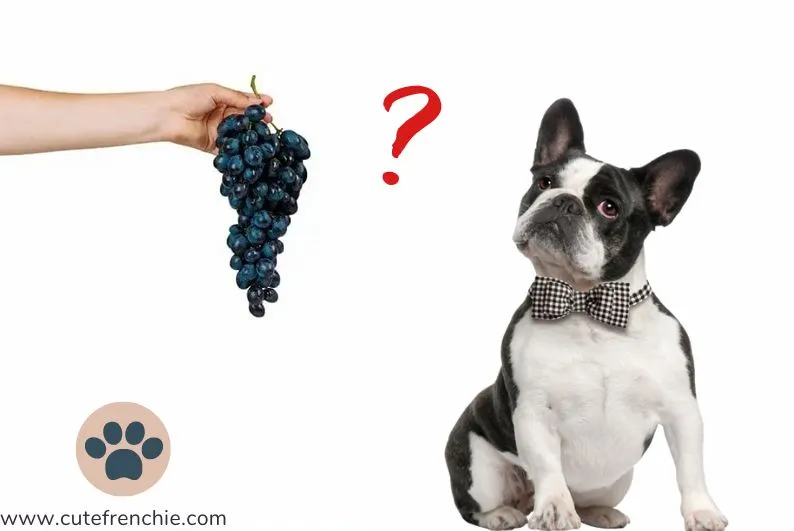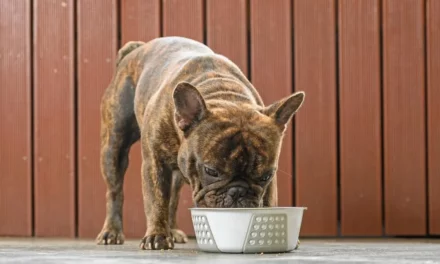Can French Bulldogs Eat Grapes?

Among these queries, a significant one that arises concerns their dietary habits: Can French bulldog eat Grapes?
Throughout this article, we will delve into this query and explore several others surrounding the consumption of grapes by French Bulldogs.
Additionally, we’ll investigate the safety measures, potential risks, and necessary precautions associated with feeding grapes to these beloved canine companions.
Get ready to uncover the answers to these pressing questions and gain a comprehensive understanding of the relationship between French Bulldogs and grapes.
Are Grapes Good For French Bulldogs?
Grapes, while a delectable treat for humans, are far from being a suitable snack for our French Bulldogs. In fact, grapes pose a significant threat to the health and well-being of these charming companions. The toxic nature of grapes and raisins for French Bulldogs stems from certain compounds that can lead to severe complications, including kidney failure.
Despite their innocent appearance, the potential risks far outweigh any perceived benefits. It’s essential for French Bulldog owners to recognize that grapes are not only unsuitable but downright hazardous to their furry friends.
Opting for safer and vet-approved treats ensures a diet that promotes longevity and vitality, steering clear of potential dangers lurking within seemingly innocuous fruits like grapes.
Can French Bulldogs Eat Grapes & Raisins?

When it comes to our French Bulldogs enjoying grapes and raisins, the verdict is a firm “no.” While we humans savor these fruits without a second thought, it turns out they can spell trouble for our furry friends. These innocent-looking snacks harbor substances that can wreak havoc on a French Bulldog’s health, potentially leading to kidney failure.
It’s a bit like discovering a treat we love is off-limits for our canine pals. To keep our French Bulldogs safe and happy, it’s best to nix the grapes and raisins from their menu. Opting for dog-friendly treats not only ensures their health but also guarantees they get to indulge in something equally delightful without any worries.
Always consult with the vet to tailor a diet that keeps our Frenchies wagging their tails in good health.
Why Grapes and Raisins Are Toxic to French Bulldogs

The toxicity of grapes and raisins to French Bulldogs lies in a hidden danger that defies their sweet and tempting exterior. Within these seemingly harmless fruits are compounds that can lead to severe health issues for our cherished companions.
While the exact mechanism of toxicity is not fully understood, the consequences are alarmingly consistent, often manifesting as kidney failure in dogs, including French Bulldogs. The toxic reaction can be unpredictable, with some dogs showing adverse effects even from small quantities.
Understanding why grapes and raisins are toxic is essential for pet owners, emphasizing the importance of steering clear of these fruits to safeguard the well-being of our beloved French Bulldogs.
What Are the Symptoms of Grape Poisoning in French Bulldogs?

French Bulldogs, with their distinctive personalities, require vigilant care, especially when it comes to their diet. While these charming companions bring immense joy, certain foods can pose serious risks, and grapes are among the culprits. Understanding the symptoms of grape poisoning in French Bulldogs is essential for responsible pet ownership. Let’s delve into the subtle indicators that may signal trouble when your Frenchie has indulged in grapes.
- Grapes Unveiled: Though grapes may seem innocuous, they conceal toxins, but their exact nature is still mysterious. These compounds can harm a dog’s system, particularly the kidneys, highlighting the danger despite the lack of a clear explanation.
- Spotting Trouble: Observing a Frenchie for early signs like vomiting, diarrhea, lethargy, or loss of appetite is crucial. More severe symptoms, including abdominal pain and dehydration, may follow, underlining the urgency of recognizing and acting on these indicators.
- Deceptive Variability: Grape poisoning symptoms vary, with some dogs showing immediate distress while others may appear unaffected for hours. This unpredictability reinforces the need for constant vigilance, even if initial signs are absent.
- Swift Response: When symptoms arise, immediate action is essential. Contact your vet promptly, detailing grape quantity, type, and observed symptoms. Timely professional guidance ensures appropriate steps are taken to address toxicity and potential kidney damage.
- Holistic Vigilance: Understanding grape poisoning symptoms goes beyond a specific incident. It emphasizes the broader responsibility of vigilant pet ownership, including regular check-ups and proactive measures to prevent access to harmful foods.
Steps To Take If Your French Bulldog Eats Grapes
French Bulldogs, with their undeniable charm, may encounter health risks if they consume grapes. Knowing the steps to take if your Frenchie eats grapes is crucial for prompt intervention.
1. Stay Composed and Assess
In the event of grape ingestion, maintain composure. Assess the situation quickly, noting the quantity ingested and immediate reactions.
2. Contact Your Vet Urgently
Reach out to your vet immediately, providing details like grape type, estimated quantity, and ingestion time for tailored guidance.
3. Avoid DIY Vomiting
Avoid inducing vomiting without professional guidance to prevent complications. Rely on your vet’s expertise for this step.
4. Follow Vet’s Recommendations
Adhere closely to your vet’s advice, which may involve immediate treatment or controlled vomiting in a clinical setting.
5. Monitor for Symptoms
Vigilantly observe for grape toxicity symptoms such as vomiting, diarrhea, lethargy, abdominal pain, or reduced urine production.
6. Seek Professional Assistance
If symptoms manifest or are as advised, seek professional veterinary assistance promptly for timely intervention.
7. Encourage Hydration
Offer fresh water to encourage hydration, supporting kidney function. Avoid force-feeding water to prevent exacerbating the situation.
8. Prepare Detailed Medical History
Compile a detailed medical history, including existing health conditions and medications, to assist your vet in making informed decisions.
What types of grapes are dangerous to French Bulldogs?

French Bulldogs, with their unique dietary considerations, demands a nuanced understanding of grape dangers. Not all grape varieties pose the same risks, and discerning the nuances is crucial for responsible pet ownership.
- The Color Spectrum: Red, Black, and Green
Grapes span a spectrum of colors, from red and black to green, each carrying distinct toxic compounds. Resveratrol in red and black grapes, and shared elements in green grapes, make them potential hazards for French Bulldogs.
- Size Matters: Small Grapes, Big Risks
Even small-sized grapes pack a potent toxicity punch for French Bulldogs. Concentrated toxic compounds mean that even a handful of these petite fruits can pose a considerable threat to your furry friend’s health.
- Seedless Risk: Convenience with Caution
Seedless grapes, while convenient, don’t escape the presence of toxic compounds. French Bulldog owners need to exercise caution, recognizing that seemingly harmless varieties can still pose risks.
- Raisins: Dehydrated Danger
Raisins, the dried counterparts, concentrate toxicity. Understanding the link between raisins and grapes is vital, as even a small quantity can lead to severe consequences for French Bulldogs.
- Unpredictable Sensitivity: Varying Reactions
Sensitivity to grape varieties varies among French Bulldogs. The unpredictability underscores the need for a cautious approach, regardless of grape variety, to ensure the health and safety of our beloved companions.
How long after eating grapes will a French Bulldog become sick?
When it comes to our French Bulldogs and grape ingestion, there’s no set timeline for when they might start feeling unwell. It’s a bit unpredictable – some dogs show signs of trouble within a few hours of munching on grapes, while others may not display any immediate symptoms.
This uncertainty emphasizes the need for constant vigilance. If you suspect your furry friend has had a grape feast and notice anything unusual like vomiting, changes in energy, or shifts in appetite, it’s time for prompt action.
Waiting around isn’t the game here – quick veterinary attention is crucial. The earlier we act, the better the chances of avoiding any serious health issues linked to those sneaky grapes.
Can Puppies Have Grapes?

No, puppies, including our adorable French Bulldog pups, should not be given grapes. The toxic compounds present in grapes and raisins that can cause harm to dogs are not fully understood, making it unsafe to assume that puppies are exempt from the risks.
Even small quantities can lead to severe consequences, such as kidney failure. Puppies, being more delicate and susceptible, require extra caution in their diet. It’s crucial for responsible pet owners to be aware of potential hazards and, in the case of grapes, err on the side of caution by avoiding any exposure to these fruits for their young furry companions.
Opting for safe and vet-approved treats ensures a healthy and worry-free start for our growing French Bulldog puppies.
What If Your Frenchie Has Eaten Some Grapes But Has No Symptoms of Poisoning?
If your French Bulldog has consumed grapes but shows no immediate symptoms of poisoning, it’s crucial not to assume all is well. The unpredictable nature of grape toxicity means that symptoms may not manifest immediately, and delayed reactions are possible.
Instead of waiting for signs of distress, take proactive steps. Contact your veterinarian promptly, providing details about the quantity and type of grapes ingested. The vet may recommend inducing vomiting or other precautionary measures to prevent potential toxicity, even if symptoms haven’t surfaced yet.
Swift professional guidance is key, ensuring the well-being of your Frenchie and preventing any latent effects of grape ingestion from causing harm in the future.
How Many Grapes Can A French Bulldog Eat Safely?

When it comes to our French Bulldogs and grapes, there’s no safe quantity that we can rely on. These little guys are unique, and even a small bite of grapes can lead to serious issues like kidney failure.
Unlike us, their tolerance to these fruits can vary widely, making it impossible to pinpoint a specific limit. So, instead of trying to figure out the magic number, it’s safest to skip the grapes altogether.
Our furry friends have plenty of other tasty and safe treats to enjoy, approved by vets to keep them happy and healthy without any grape-related worries.
How to Prevent Your Frenchie From Eating Grapes or Raisins?
Preventing your French Bulldog from consuming grapes or raisins requires a proactive and vigilant approach. Start by thoroughly educating yourself and everyone in your household about the dangers associated with these fruits. Keep all grape-containing products, including raisins and foods with grape derivatives, securely stored out of your Frenchie’s reach.
Be cautious during meal preparation and ensure that grapes are not dropped or left within easy access. When on walks or in outdoor spaces, monitor your dog closely to prevent any unintended grape ingestion. Train your French Bulldog with basic commands to reinforce their impulse control, ensuring they understand the “leave it” command can be particularly helpful in deterring them from grabbing grapes.
Lastly, maintain a list of safe and vet-approved treats for your Frenchie, ensuring they have enticing alternatives that won’t compromise their health.
Frequently Asked Questions
Can a single grape kill a French Bulldog?
A single grape may not always lead to fatality, but it poses a considerable risk due to the presence of toxic compounds. The impact varies among individual dogs, and even a small quantity can result in severe consequences. Immediate veterinary attention is crucial in such cases.
My French Bulldog ate a grape, what should I do?
If your Frenchie has ingested a grape, prompt action is essential. Contact your veterinarian immediately, providing details about the quantity and type of grape consumed. Your vet may advise inducing vomiting or recommend other precautionary measures to mitigate potential toxicity.
My French Bulldog ate a grape but seems fine, what should I do?
The absence of immediate symptoms doesn’t guarantee safety. Grape toxicity can have delayed reactions. Contact your vet promptly, even if your Frenchie appears fine, for professional guidance. Monitoring for symptoms and following the vet’s recommendations is crucial for proactive care.
How to prevent your French Bulldog from being poisoned?
Preventing grape or raisin poisoning involves awareness, secure storage of grape-containing products, caution during meal preparation, outdoor vigilance, basic training commands, and providing vet-approved alternatives. Implementing these strategies creates a grape-free environment for your Frenchie.
My French Bulldog eats grapes all the time, should I stop feeding them?
Yes, it’s imperative to cease feeding your Frenchie grapes immediately. Even if they show no immediate adverse reactions, the risks associated with grape consumption are significant. Opt for vet-approved treats as safe alternatives to ensure your French Bulldog’s well-being and enjoyment.
wrapping up :
When it comes to sharing grapes with our French Bulldogs, the path is laden with uncertainties. The potential risks, from toxicity to unpredictable reactions, call for a cautious stance. To keep our furry friends safe and happy, it’s best to skip the grapes entirely.
Choose vet-approved treats and implement preventive measures, creating a carefree environment for our Frenchies. Their well-being remains our top priority, ensuring a joyful and healthy journey together.
FURTHER READING
For information, we have a range of articles discussing the best food and nutrition options, for your French Bulldog as well as tips, on maintaining their health and providing proper care.




